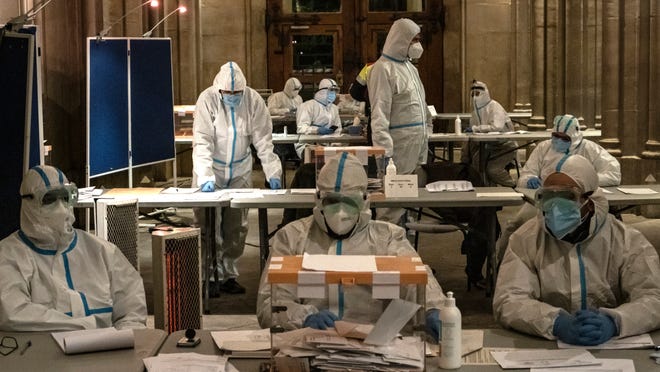US life expectancy at record low; Blacks, Latinos most affected
A study published Thursday found life expectancy in the United States dropped to its lowest level in 15 years, and even lower for Black Americans and Latinos, during the first half of the coronavirus pandemic.
Data through June 2020 shows life expectancy at birth for the total U.S. population fell from 2019 by a year to 77.8 years, the lowest since 2006, according to researchers at the Centers for Disease Control and Prevention’s National Center for Health Statistics.
Life expectancy for Black populations declined the most from 2019 – by 2.7 years, to 72 years – its lowest level since 2001. Latinos experienced the second-biggest decline, falling 1.9 years since 2019 to a life expectancy of 79.9 years, lower than when it was first recorded in 2006.
The disparities highlighted in the study add to the mounting evidence of COVID-19’s disproportional effect on Blacks and Latinos, health experts say.
“It was disturbing to see that gains that have been made for the Black community and decreasing the gap between life expectancy for African Americans and (white) Americans over the past six years had come to a halt,” said Dr. Leon McDougle, president of the National Medical Association.
Black Americans are hospitalized with COVID-19 at 2.9 times the rate of white Americans and die at 1.9 times the rate, according to CDC data. Latinos are hospitalized at more than three times the rate and die more than twice the rate of white Americans.
While the life expectancy gap between Black, Latino and white populations were narrowing before the pandemic, overall life expectancy was steadily declining because of a variety of public health issues, said Michal Engelman, associate professor of sociology at the University of Wisconsin-Madison.
Life expectancy in the U.S. decreased from 2014 to 2017 by .3 years and slightly increased 2018 through 2019 by .2 years, according to CDC data. Instead of improving on those modest gains in 2020, Engelman said, the nation saw a backslide because of the pandemic.
“This has been an issue of concern for a while, that we weren’t making progress and we were sliding a little bit backwards,” she said. “After a couple of years of worrisome declines, we dropped as a country a whole year just in the first half of 2020.”
‘Just not equal at all’:Vaccine rollout in Chicago a microcosm of racial disparities nationwide
What does endemic mean? Health officials say the coronavirus will likely become endemic in the next several years.
Health experts fear U.S. life expectancy in 2020 as a whole will be worsethan the half-year numbers because they do not account for the fall and winter surges that led to record COVID-19 deaths.
A study published in early February predicted the pandemic would reduce overall life expectancy by 1.13 years in 2020, with life expectancy for Black and Latino populations three to four times lower than white Americans.
According to the report, published in the peer-reviewed journal Proceedings of the National Academy of Science, COVID-19 was expected to reverse more than 10 years of progress in closing the Black-white gap, and cut the life expectancy advantage Latinos have over other racial groups and ethnicities by more than 70%.
But study co-author Noreen Goldman, professor of demography and public affairs at Princeton University, says fallout from thepandemic may be worse becauseher study doesn’t account for indirectly attributed deaths.
“It is interesting that the two estimates are so close to one another but … I think (and fear) that the final estimate for the decline in life expectancy in 2020 will be non-trivially higher,” she said.
Goldman also worriesthe U.S. is in for a long road to recovery. Deaths in January 2021 exceeded any monthly total in 2020, and they continue to be relatively high in February despite the rollout of vaccines and a decrease in COVID-19 cases.
Those who have recovered from the disease also may develop long-term health problems, Goldman said, creating new illnesses and worsening preexisting health conditions.
“In addition, the huge social and economic impacts of the pandemic will almost certainly have a detrimental impact on health and survival for years to come,” she said. “I imagine the U.S. can eventually recover, but recovery will not happen quickly.”
But recovery is possible, health experts say. The Biden administration is “off to a good start” with the creation of the COVID-19 Health Equity Task Force, a move that McDougle calls “long overdue.”
Engelman stresses the nation’s life expectancy goal shouldn’t be a return to pre-pandemic levels. Instead, public health policies should focus on investments to change existing infrastructures that create health inequities.
“The inequalities that existed in 2019 is what contributed to the impact,” she said. “It’s not ‘Go back to where we were’ but ‘How can we do this over again so we’re not vulnerable to pandemics in the same way?’”
Follow Adrianna Rodriguez on Twitter: @AdriannaUSAT.
Health and patient safety coverage at USA TODAY is made possible in part by a grant from the Masimo Foundation for Ethics, Innovation and Competition in Healthcare. The Masimo Foundation does not provide editorial input.

